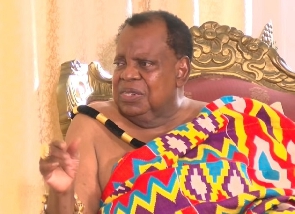The Paramount Chief of Asokore Asante, Nana S. K. B. Asante, has emphasised the need for a careful study of the antecedents and merits of the 1992 Constitution as part of the ongoing talks for a review process.
Dr. Asante, a distinguished scholar, constitutional lawyer, and negotiation expert, highlighted the importance of meaningful reform proposals in this exercise.
Drawing a parallel to the Supreme Court's approach to constitutional, he explained that considering the background and expert recommendations should precede focusing on the constitution's text.
Furthermore, he noted that societal challenges such as corruption, economic flaws, and indiscipline should not be solely attributed to the constitution.
The chief expressed these views during the Institute of Economic Affairs (IEA) constitutional review series, where prominent chiefs shared their contributions to the ongoing discussion on meeting the present requirements.
Speaking on the theme: "Reviewing Ghana's 1992 Constitution: Viewpoints from the National House of Chiefs," Nana Asante emphasised the importance of recognising Ghana's international reputation for democratic and constitutional stability and how it has brought economic benefits.
He cautioned against uninformed criticisms of the constitution and called for a comprehensive analysis of its contributions to consolidating the country's democracy.
He also addressed the issue of excessive presidential powers, highlighting their origins in the 1979 Constitution and encouraging a detailed examination of all constitutional provisions.
Dr. Asante highlighted the necessity of conducting a realistic analysis of appointments made by the president, including heads of constitutional bodies, judges of the Supreme Court, the Chief Justice, and District Chief Executives. He suggested considering which appointments should remain under the president's authority and which should be delegated to other bodies.
Regarding the participation of chiefs in politics, Nana Asante deemed it inappropriate but emphasised their potential to contribute to community and national development.
Proposing recommendations on behalf of the president of the National House of Chiefs, Nana Ogyeahohoo Yaw Gyebi II, and Dr. Asante advocated the need to reduce the appointment of ministers of parliament to maintain effective parliamentary oversight.
He also suggested that an independent authority, rather than the presidency, should be responsible for appointing heads of all constitutional bodies, including the Electoral Commission and the Commission on Human Rights and Administrative Justice (CHRAJ). Additionally, he proposed limiting the number of Supreme Court judges and establishing a second Chamber to serve as a check on parliamentary work.
General News of Wednesday, 21 June 2023
Source: classfmonline.com

















